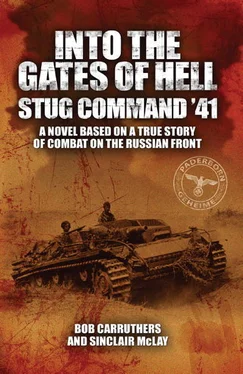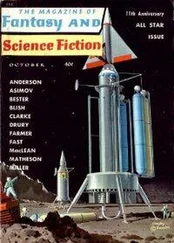Within the hour he had his amateur transmitter and immediately began to send the message VSWENDORFFINEASTFORTRESS. He then transmitted his simple message again and again. VSWENDORFFINEASTFORTRESS, VSWENDORFFINEASTFORTRESS. He had no way of knowing if his message was being received and his plight had unhinged his normally calm manner. Over and over again, in a frenzy which bordered on madness, Wendorff sent and resent his message. All he could do now was hope against hope that someone would receive it and understood what it meant.
* * * * *
Day by day the grind of the fighting continued. German troops eventually captured the main body of the Volhyn fortification, but only after three days of intense and unremitting close combat. Only eighteen of its original detachment of three hundred defenders remained alive. The bitter fight for the Volhyn fortification mirrored the fight for the Terespol gate, which had flared up at the outset of the German offensive.
As he sat hunched in his headquarters, desperately attempting to find a solution to the increasing mass of issues, Fomin was vaguely aware that the last of the Terespol fighters had staged a breakout. The bedraggled band of survivors was brought in to give their report of the fighting to Commissar Fomin.
“Comrades, you’ve been through a great deal. No need for formality, just tell me what happened,” said Fomin, turning his attention to the grime-encrusted corporal whom he assumed to be the leader of the small band of survivors.
“I will try, comrade,” said Corporal Vadim. “When the attack came there were about three hundred officers and men inside the Terespol fortification.”
The shell-shocked corporal had just led the small band through hell on earth to reach this new position and he was still breathing hard.
“We were unprepared to repel the enemy’s surprise attack, so they gained a foothold. However, within a few hours we had managed to rally ourselves and drove the German troops from the fortification. We later learned that this had cut off communication with the German force that had managed to get beyond us and infiltrate the citadel. Under the direction of two border-guard officers, Fyodor Melnikov and Akim Cherny, who rallied round and led the organization of the defence, we were able to mount a coherent defence for some days. However, we were always too few in number and we did not have sufficient ammunition, provisions or water.
“We therefore fought our way through◦— on the night of the 24th of June◦— to the Kobrin fortification, and then, today, here to the citadel. The steadfastness of the defenders of the Terespol fortification is best illustrated by one heroic example. During the breakthrough, we found a border-guard with a light machine gun in the bushes. There were a great many spent cartridge cases on the ground around him, along with reserve disks for his machine gun, and there were dozens of dead Nazis lying nearby. He was apparently on duty at one of the border posts when war found him, and he remained at his post all these days, carrying on an unequal battle with the enemy.
“When we found him, he looked terrible. His eyes were bloodshot and his face was grey and pinched. His bony hands were still clutching the machine gun grip. He had obviously not eaten or slept for several days. He seemed to be unconscious. Suddenly he raised his head and looked at us. We suggested that he should join us in the breakout, but he parted his cracked lips with difficulty and said firmly: “I will never leave this spot.”
“That is the kind of spirit we will all need to demonstrate if we are to hold out until we are relieved,” said Fomin. “We are in need of reinforcements here. How many are left of your group?”
“I regret to inform you that our numbers are few,” replied Vadim. “Only fifteen men remain alive out of the three hundred who defended the Terespol fortification. The enemy suffered heavy losses too. I dutifully report that we effectively stopped their advance, although all of our officers were killed. I am privileged to report that we held on persistently, but our situation was becoming markedly worse. The lack of adequate ammunition and food supplies was obvious. More seriously though, we had no water, and the wounded needed medical attention. Nikolai Nesterchuk was wounded by an enemy grenade during one of the attacks, but he unfurled a red flag above the casemate. It was struck down by shells and machine-gun fire, yet each time he raised it again.
“After repeated attacks, the fascists succeeded in breaking into the casemates. After hand-to-hand combat, they captured Lieutenant Akimochkin, who was wounded and shell-shocked. As I retreated towards the citadel I looked back and saw Lieutenant Akimochkin executed.”
* * * * *
“Today, we will deal with the theory and practice of Morse,” began SS-Obersturmführer Sanger.
His unwilling pupil again felt his heart sink to the soles of his boots. Wohl craved sleep. All he could think about was the need to rest his tired brain and yet here he was, again faced by this relentless tormentor.
“Now the British, who invented the system, have their own systems for learning Morse, but they cannot compete with German ingenuity! We do our research, do we not?” It was a rhetorical question and one to which Wohl could not have given an answer in any event. “Ludwig Koch! That is the man we owe this debt to. Koch was a psychologist at Die Technische Hochschule in Braunschweig. The Koch method◦— named after the great man, obviously◦— was his pronounced contribution to the field. And his goal was?”
Again Wohl could do no more than to stare blankly at the thin academic who sat opposite him.
“To discover the most efficient way to teach Morse code to young men like yourself◦— prospective radiotelegraph operators◦— in order that you might meet international standards in the shortest time possible,” Sanger continued. “So, what are these standards? The operator must send 100 words in five minutes. They must copy a 100 word telegram, also in five minutes, and copy 125 words of ordinary text in five minutes◦— one word being reckoned as five letters. So, how did he set about achieving this?”
Otto Wohl felt like his eyes were glazing over, but he thought he should contribute something by way of reply. “I do not know, SS-Obersturmführer.”
“You need to research, SS-Kannonier! Research! Find out what the best are doing, examine current teaching methods, test them, and then, when you have done your research and have your results, devise something better! Koch ran three series of tests to determine how the code is comprehended and for this purpose used four competent, actively-practicing, radio telegraphers. Three of these operators had learned the code solely by sound, while the fourth was self-taught from printed code charts.”
Sanger was now immersed in his own world and it no longer mattered whether Wohl was following or not.
“For the first test, each operator was to send, by regular hand-key, the series of ten letters◦— b, c, v, q, f, l, h, y, z, and x◦— at various speeds while monitoring his transmission with a pair of headphones to satisfy himself as to its quality. Out of his sight and hearing, a recording system made an accurate timed graphical record of his transmission so that the actual timing of signal and space durations could be examined in detail. Below about ten words per minute the only operator who closely conformed to standard timing was the one who had visually learned the code. The other three deviated considerably from ‘standard’ timing. At five words per minute these deviations were appreciable. The dits were too short, the dahs tended to be longer than three times dit length, and the spaces between characters were too long.” Sanger paused briefly. “Are you following me?”
Читать дальше












